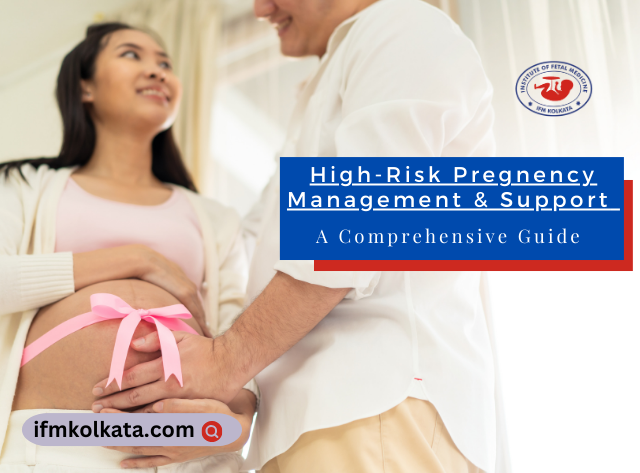Pregnancy is an incredible journey, often filled with anticipation and joy. However, for some expectant mothers, the path to motherhood is more complex due to high-risk pregnancies. These pregnancies require special attention, care, and support to ensure the health and well-being of both the mother and the baby. In this comprehensive article, we will delve into the various aspects of high-risk pregnancy management, from common risk factors to specialized medical care and emotional support for expectant mothers.
Understanding High-Risk Pregnancies
A high-risk pregnancy is one in which the health or life of the mother, the baby, or both is at risk due to specific medical or pregnancy-related factors. While every pregnancy has its unique challenges, certain conditions and situations elevate the risk. Common risk factors for high-risk pregnancies include:
Advanced Maternal Age: Pregnancy after the age of 35 is associated with an increased risk of complications, including gestational diabetes, preeclampsia, and chromosomal abnormalities.
Medical Conditions: Pre-existing medical conditions such as diabetes, hypertension, heart disease, and autoimmune disorders can complicate pregnancy.
Multiple Pregnancies: Carrying twins, triplets, or more increases the risk of complications, including preterm birth and low birth weight.
Reproductive History: Previous complications such as preterm birth, miscarriage, or stillbirth can heighten the risk of recurrence.
Infections: Certain infections, such as HIV or rubella, can pose serious risks to both the mother and the baby.
Placental Problems: Conditions like placenta previa or placental abruption can lead to bleeding and pose serious risks.
Preterm Labour: A history of preterm birth or signs of early labour can make a pregnancy high-risk.
Specialized Medical Care for High-Risk Pregnancies
High-risk pregnancies require specialized care and close monitoring to manage potential complications. Key components of medical care for high-risk pregnancies include:
Early and Regular Prenatal Visits: High-risk pregnancies demand close medical supervision, often requiring more frequent prenatal visits to monitor the mother and baby’s health.
Diagnostic Testing: High-risk pregnancies may involve more extensive diagnostic testing, including blood tests, ultrasounds, and genetic screening to detect and manage potential issues.
Consultation with Specialists: Many high-risk pregnancies benefit from consultations with maternal-fetal medicine specialists, obstetricians who specialize in high-risk pregnancies, and other medical experts.
Medication and Treatment: Medications may be prescribed to manage underlying medical conditions, and medical interventions may be necessary to address complications.
Hospitalization: In some cases, hospitalization may be required to ensure the mother and baby receives the best possible care.
Emotional Support for Expectant Mothers
High-risk pregnancies can be emotionally challenging for expectant mothers. Emotional support plays a crucial role in helping these women navigate the unique stressors and uncertainties they face. Here are some key aspects of emotional support:
Open Communication: Healthcare providers should maintain open and honest communication with expectant mothers, providing clear explanations of their condition, treatment options, and potential outcomes.
Support Groups: Joining support groups for women with high-risk pregnancies can provide a sense of community and understanding.
Counselling: Professional counselling or therapy can help expectant mothers manage anxiety, stress, and emotional challenges.
Partner and Family Support: The involvement and support of partners and family members can greatly benefit expectant mothers during this challenging time.
Self-Care: Encouraging self-care practices, including relaxation techniques, exercise, and proper nutrition, can help manage stress and anxiety.
High-risk pregnancies require a comprehensive approach that addresses medical, emotional, and psychological aspects. Understanding the common risk factors, specialized medical care, and emotional support available for expectant mothers is essential for ensuring the best possible outcomes. High-risk pregnancies can be successfully managed, allowing expectant mothers and their babies to navigate this unique journey with confidence and optimism.
For expectant mothers facing a high-risk pregnancy, seeking early and continuous medical care, and surrounding themselves with a strong support network, can make a significant difference in ensuring a safe and healthy outcome for both mother and baby.
Nutrition and Lifestyle
Maintaining a balanced diet and a healthy lifestyle is essential for expectant mothers with high-risk pregnancies. Nutrition plays a critical role in managing conditions like gestational diabetes and hypertension. Healthcare providers often recommend specific dietary guidelines and may advise on weight management to reduce risks.
Fetal Monitoring
Continuous fetal monitoring is often a crucial component of high-risk pregnancy care. Non-stress tests (NSTs) and biophysical profiles are common methods used to assess the baby’s well-being and response to stressors.
Preventive Measures
Preventive measures, such as vaccinations, may be recommended to protect both the mother and the baby from potentially harmful infections. It’s important for expectant mothers to discuss vaccination recommendations with their healthcare provider.
Bed Rest and Activity Limitation
In some high-risk pregnancies, healthcare providers may recommend bed rest or activity limitation to reduce the risk of complications. This can be challenging for expectant mothers, and emotional support is especially important in these cases.
Emergency Preparedness
Expectant mothers with high-risk pregnancies should have an emergency plan in place. This plan may include knowing the signs of preterm labour, having contact information for healthcare providers readily available, and understanding when to seek immediate medical attention.
C-Section Considerations
In certain high-risk situations, a caesarean section (C-section) may be recommended. It’s important for expectant mothers to discuss the circumstances under which a C-section might be necessary and what to expect during and after the procedure.
Postnatal Care
The journey doesn’t end with delivery. Acheter cialis en ligne france
High-risk pregnancies often require continued monitoring and care after childbirth. Understanding the postnatal care plan is essential for a smooth transition into motherhood.
High-risk pregnancies demand a multifaceted approach that encompasses medical, emotional, and lifestyle considerations. By understanding the common risk factors, seeking specialized medical care, and surrounding themselves with a support network, expectant mothers can navigate high-risk pregnancies with greater confidence and the best possible outcomes.
It’s important for expectant mothers to remember that they are not alone in this journey. Healthcare providers, family members, and support groups are there to guide and assist them through the challenges of high-risk pregnancies, ultimately leading to the birth of a healthy and happy baby.

